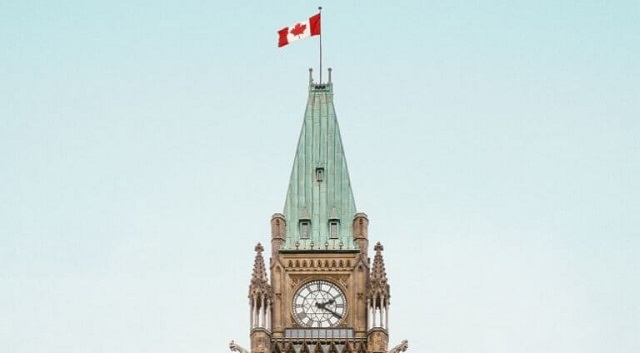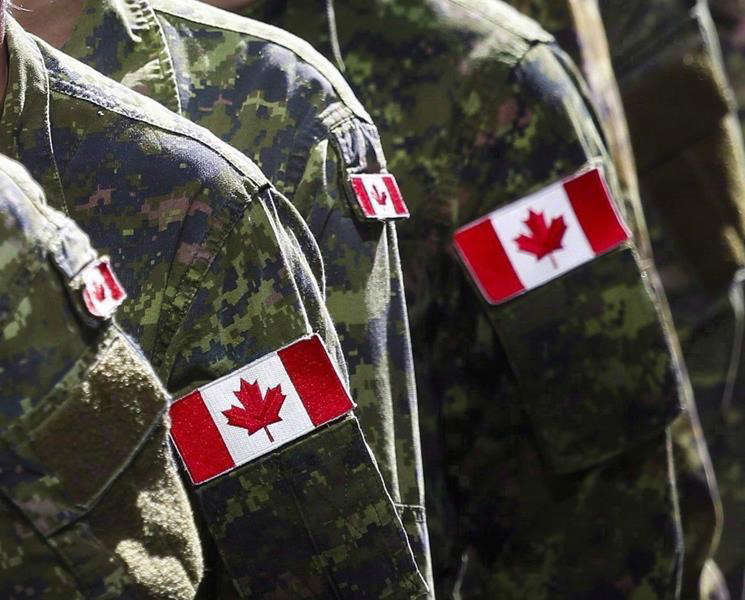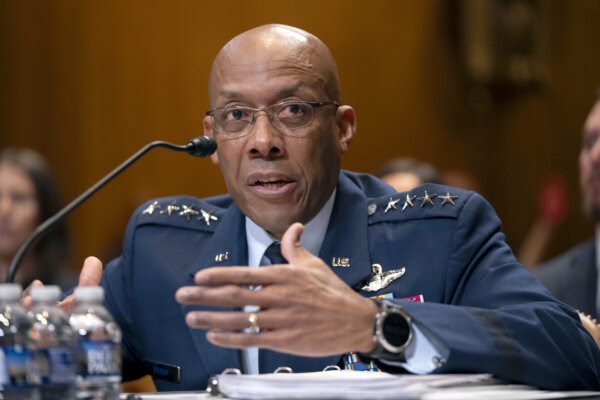armed forces
Canada used to punch above its weight, but our defence capacity now seems an impossible dream: Richard Fadden

From the MacDonald Laurier Institute
By Richard Fadden
We are now in a period of crisis such that we must step up our efforts to bolster our national security and protect the international order that has served us so well.
“To dream the impossible dream.” These words, sung by Don Quixote in Man of LaMancha, reflect a sentiment often felt about the state of Canada’s national security. For decades, our positions on foreign policy, defence and security could only be evaluated as weak. And this is not a partisan perspective: since at least the end of the Cold War, successive federal governments have done as little as possible in these policy areas. Why does a G7 country – one of the richest in the world – systematically prioritize these sectors below virtually all others? We continue to do this while Canada benefits from the international order, which is now clearly at risk.
It was not always thus. Canada ended the Second World War with the fourth-largest air force among Allied countries and the third-largest navy in the world. At least once during his postwar term, Louis St. Laurent’s government spent 7 per cent of the GDP on national defence. Then, Lester B. Pearson essentially invented modern peacekeeping. In the months after 9/11, Jean Chrétien’s government spent an additional $7.7-billion on security while fundamentally updating our national security legislation. Stephen Harper’s government stepped up during our engagement in Afghanistan. But outside of these moments, often motivated by existential or critical events, national security has not rated much attention by either Liberal or Conservative governments, nor by any of the other parties in Parliament.
Why do Canadian politicians ignore it as much as they can? The simplest reason is that Canadians, generally, are not interested. Most of us are not currently asking our governments to take the rapidly deteriorating international environment as seriously as virtually all of our allies do. Despite living in an entirely globalized world, many Canadians seem to believe that Canada is not facing any particular threat – so why spend money on protecting ourselves?
It’s true that because of our location in North America, we are not about to be invaded. But this is not 1914. The determined efforts of China, Russia and others to alter the international system on which most of our peace and prosperity depend can ultimately harm us as much as the artillery or bombing attacks of previous wars. And this is without taking into account the dangers of cyberattacks against our society and economy. This is not warmongering: democratic governments around the world are strengthening their defence and security establishments while actively pursuing foreign policies that take this new environment into account. For a country that has long preached the value of globalization – and benefitted from it – Canada inexplicably seems to ignore that national security issues are also a consequence of globalization.
While we have promised NATO that we will spend 2 per cent of our GDP on defence, we have also planned to cut our defence spending. We have also failed to deal with systemic personnel and procurement issues besetting our defence establishment. The current government has pointed to a number of significant capital expenses as proof that we are hitting the 2-per-cent target, but most of this spending has merely been to replace aging vital equipment. This does not represent an adequate response to a deteriorating international order, nor does it bolster the capacity of the Canadian Forces.
On the security side, after months of all parties acknowledging the threat of foreign interference, we are finally holding a public inquiry on the matter which may well prove to be useful. But it will almost certainly release its report when it is too late for the current government to act on its recommendations. Indeed, the timing makes it easy to invoke the inquiry as a reason to avoid taking action to develop a foreign-agents registry, to update our national security legislation, or to deal with threats to our democratic institutions, civil society and the private sector.
For years, Canada punched above its weight internationally. We did so because we used the tools of diplomacy, defence, security and development to advance our interests and values. We recognized that, as a middle power, we needed to use every available tool of soft and hard power to effectively advance our interests and those of our allies. And, critically, we backed these efforts with the resources to make our proposals real. Much of the Western world seems to agree that we are now in a period of crisis such that we must step up our efforts to bolster our national security and protect the international order that has served us so well. While it is the duty of governments to act, opposition parties must also share in the responsibility to recognize the threats we face, and to advocate for responsible action. So far, no one gets a passing grade. We have been left, alongside our allies, to dream the impossible dream.
Richard Fadden is an MLI advisory council member, a former national security adviser to the prime minister, former deputy minister of national defence, and former director of the Canadian Security Intelligence Service (CSIS).
armed forces
Canada’s Military is Collapsing. Without Urgent Action, We Won’t Be Able To Defend Ourselves

From the Frontier Centre for Public Policy
By David Leis
Decades of underfunding and political neglect have left our military weak and unprepared
What Lt.-Gen (retired) Michel Maisonneuve (ret.) told me about Canada’s military was nothing short of alarming. He didn’t mince words—our armed forces are in dire straits. If we don’t act now, Canada will not only be unable to defend itself, but it will cease to be taken seriously by our allies, many of whom are already losing patience with our military decline.
Maisonneuve has seen firsthand what a functioning military looks like. He has served at the highest levels, working alongside our allies in NATO, and he knows exactly what Canada is failing to do. “We are no longer at the table when major defence decisions are made,” he told me. “The Americans don’t ask us what we think anymore because they know we can’t contribute.” That is a stunning indictment of where we now stand—a country that was once respected for its ability to punch above its weight militarily has been reduced to an afterthought.
The problem, as Maisonneuve laid out, is both simple and staggering: Canada doesn’t take its defence seriously anymore. The government has allowed our forces to wither. The Air Force is still buying CF-18s from the 1980s because the long-delayed F-35 procurement is years behind schedule. The Navy, once a competent maritime force, is barely functional, with no operational submarines and a fleet that is nowhere near what is needed to patrol our vast coastlines.
Meanwhile, the Army is struggling to recruit and retain soldiers, leaving its numbers dangerously low. “We have an Army in name only,” Maisonneuve said. “If we were called upon tomorrow to deploy a fully operational combat force, we couldn’t do it.”
Even more shocking is the state of readiness of our troops. A recent report found that 75 per cent of Canadian military personnel are overweight. Maisonneuve didn’t sugarcoat it:
“It’s unacceptable. We are supposed to be training warriors, not watching fitness standards collapse.” When the people entrusted with defending our country are struggling with basic physical fitness, it speaks to something much deeper—an institutional rot that has infected the entire system. Our allies have noticed. Canada was locked out of AUKUS, the military alliance between the U.S., the U.K. and Australia. “It wasn’t an oversight,” Maisonneuve explained. “It was a deliberate snub. The Americans don’t see us as a serious defence partner anymore.” That snub should have been a wake-up call. Instead, our government shrugged it off.
Meanwhile, Washington is openly questioning Canada’s value in NATO. The Americans see the numbers—Canada refuses to meet even the minimum defence spending requirement of two per cent of GDP. Instead of fulfilling our obligations, we offer up empty promises and expect others to pick up the slack.
Maisonneuve is blunt about what needs to be done. “First, we need to fully fund the military—and that means not just hitting the NATO target but exceeding it. Our allies spend real money on their defence because they understand that security is not optional.” He suggests Canada should aim for at least 2.5 per cent of GDP, not just as a show of commitment but as a necessity to rebuild our capabilities. Beyond money, Maisonneuve argues that military culture must be restored.
“We’ve allowed ideology to creep into the ranks. The military’s primary function is to defend the nation, not to serve as a social experiment,” he said. “We need to get back to training warriors, not worrying about whether we’re ticking the right diversity boxes.” He believes a return to a warrior ethos is essential— without it, the military will remain directionless.
Procurement is another disaster that Maisonneuve insists must be fixed immediately. “We’ve spent years dithering on replacing equipment, and every delay puts us further behind,” he said. The F-35 deal should have been signed years ago, but political hesitation means we won’t see a full fleet for years. The Navy urgently needs new submarines and icebreakers, especially to secure the Arctic, where other global powers, particularly Russia, are ramping up their presence.
The biggest issue, though, is manpower. “We need to rebuild the forces, period,” Maisonneuve told me. “That means recruiting, training, and retaining soldiers, and we are failing at all three.” He even suggested that Canada should consider implementing a national service requirement, a move that would not only increase troop numbers but also instill a sense of duty and responsibility in younger generations. “We used to be a country that took security seriously,” he said. “What happened?”
That’s the question, isn’t it? What happened to Canada? How did we go from being a country that contributed meaningfully to global security to one that can’t even defend itself? The reality is that successive governments have let this happen—first by neglecting funding, then by letting bureaucracy suffocate procurement, and finally by allowing the core purpose of the military to be diluted.
Maisonneuve is clear: Canada must act now, or it will cease to be taken seriously.
David Leis is President and CEO of the Frontier Centre for Public Policy and host of the Leaders on the Frontier podcast
armed forces
Trump fires chairman of Joint Chiefs of Staff, appoints new military leader


From the Daily Caller News Foundation
By Mariane Angela
President Donald Trump announced Friday the dismissal of General Charles Brown, the current Chairman of the Joint Chiefs of Staff.
In a post on Truth Social, Trump expressed his gratitude toward Brown for his extensive contributions and leadership, wishing him and his family a prosperous future. Brown’s departure marks a pivotal moment in U.S. military leadership following over 40 years of service.
“I want to thank General Charles “CQ” Brown for his over 40 years of service to our country, including as our current Chairman of the Joint Chiefs of Staff. He is a fine gentleman and an outstanding leader, and I wish a great future for him and his family,” Trump wrote.
Simultaneously, Trump introduced his nominee for Brown’s successor.
“Today, I am honored to announce that I am nominating Air Force Lieutenant General Dan “Razin” Caine to be the next Chairman of the Joint Chiefs of Staff. General Caine is an accomplished pilot, national security expert, successful entrepreneur, and a “warfighter” with significant interagency and special operations experience,” Trump said.
Trump said Caine’s appointment comes after he was overlooked for advancement during former President Joe Biden’s presidency.
“General Caine was passed over for promotion by Sleepy Joe Biden. But not anymore! Alongside Secretary Pete Hegseth, General Caine and our military will restore peace through strength, put America First, and rebuild our military,” Trump said. President Trump also announced plans to appoint five additional senior military officials, tasks he has delegated to Secretary Hegseth.
It was reported Thursday that Hegseth plans to dismiss Brown as part of President Trump’s commitment to eliminate “wokeness” from the military. Brown reportedly appears on a list of proposed removals submitted to Congress.
Brown had previously expressed his wish to retain his position even after Trump took office, and according to sources speaking to NBC News in Dec. 2024, Trump seemingly moderated his views on the general. Biden nominated Brown as chairman in 2023, and despite a heated confirmation hearing where senators scrutinized his alleged implementation of racial quotas in Air Force hiring practices, he was confirmed.
Meanwhile, Brown’s replacement, Caine, took office as the associate director for Military Affairs at the CIA on Nov. 3, 2021, after serving as the director of Special Programs at the Pentagon. Lt. Gen. Dan Caine, an F-16 pilot with extensive experience including over 150 combat hours, was commissioned in 1990 and has held numerous key roles, from the White House staff to special operations, and balances his military career with entrepreneurial ventures.
-

 2025 Federal Election2 days ago
2025 Federal Election2 days agoJoe Tay Says He Contacted RCMP for Protection, Demands Carney Fire MP Over “Bounty” Remark
-

 2025 Federal Election2 days ago
2025 Federal Election2 days agoHong Kong-Canadian Groups Demand PM Carney Drop Liberal Candidate Over “Bounty” Remark Supporting CCP Repression
-

 2025 Federal Election2 days ago
2025 Federal Election2 days agoPoilievre To Create ‘Canada First’ National Energy Corridor
-

 2025 Federal Election2 days ago
2025 Federal Election2 days agoAlcohol tax and MP pay hike tomorrow (April 1)
-

 2025 Federal Election2 days ago
2025 Federal Election2 days agoChinese Election Interference – NDP reaction to bounty on Conservative candidate
-

 2025 Federal Election1 day ago
2025 Federal Election1 day agoChina Election Interference – Parties Received Security Briefing Days Ago as SITE Monitors Threats to Conservative Candidate Joe Tay
-

 2025 Federal Election1 day ago
2025 Federal Election1 day agoFixing Canada’s immigration system should be next government’s top priority
-

 Bruce Dowbiggin1 day ago
Bruce Dowbiggin1 day agoAre the Jays Signing Or Declining? Only Vladdy & Bo Know For Sure




